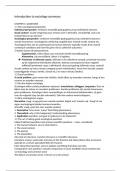Introduction to sociology summary
CHAPTER 1; QUESTIONS
1.1 The sociological perspective
Individual perspective: verklaren menselijk gedrag gefocust op individuele factoren.
Social context: sociale omgeving waar mensen zich in bevinden, veranderlijk, wat is de
invloed hiervan op mensen?
Sociological perspective: verklaren menselijke gedrag gefocust op collectieve factoren;
sociale fenomenen. Sociologische verklaring mogelijk door invloed sociale context etc.
‘Sociologists first aim to understand how human behavior typically results from shared
contextual conditions and how this gives rise to collective outcomes.’
3 relaties tussen de perspectieven:
- Supplemental; vullen elkaar aan voor beter beeld menselijk gedrag.
- Alternative; zijn verschillend, alleen 1 is legitiem.
Proximate vs ultimate causes; ultimate is de collectieve oorzaak, proximate focussen
op de subjectieve/individuele uitkomst; obesitas (consequence) door negatief
zelfbeeld (proximate cause, individueel), door pest gedrag (ultimate cause, sociaal).
Sociale context op micro niveau (omgang tussen individuelen), meso level (sociale context
tussenliggende niveau; familie, school etc.) en macro niveau (landen).
1.2 Social problems
A social problem: gaat verder dan individu, heeft effect op meerdere mensen, hangt af van
normen en waarden mensen.
1.3 De drie doelen sociologie
Sociologen willen sociale problemen oplossen: omschrijven, uitleggen, toepassen. Door te
kijken naar de natuur en oorzaken problemen. Sociale problemen zijn sociale fenomenen,
geen problemen. Sociologen doen voorspellingen en informeren beleidsmakers, zij gaan
over de volgende stap (sociale relevantie). Ook mbv andere wetenschappers.
1.4 Drie sociologische vragen
Normative vraag: vraag gaat over waarde oordeel, begint met ‘moeten wij,’ hangt af van
eigen overtuigingen/doelen/normen/waarden.
Scientific vraag: gaat niet over waarde oordeel:
1. Descriptive: how much, many? Describing phenomena.
2. Theoretical: why is this happening? Understanding phenomena.
3. Application question: wat gaat er gebeuren in de toekomst?
1.5 The art of asking good sociological questions
Make ill-defined questions into precise scientific questions -> clear, considered:
1. The human behavior you’re interested in.
2. The social context.
3. The period.
4. The population.
Also look at relevance, societal relevance or scientific relevance.
Literature review: systematic overview of the theories and observations that are known
typically in a certain specialized field of research.
False theoretical question: aims to explain something that does not exist.
Comparative-case question: includes comparison of cases (multiple social contexts etc).
1.6 Sociology and common sense
The failure of common sense, it forces us to do science:
, Private sociologists: the way human beings in daily life make sense of the social worlds. As
such they are prone to intuitive thinking etc.
Academic sociology: the way academic institutions describe the social world, based on
gathering knowledge in a scientific way.
1.7 Sociology as cumulative science
Cumulative science: the practice that theories and observations of earlier studies are
incorporated in the work of successive studies. Descriptive questions -> observation ->
theory, and this cycle repeats. They use each others findings as background information to
form new theories.
CHAPTER 2; THEORIES
2.1 Relative age effect -> the relatively older individuals are, compared to their peers, more
often selected for the best sports team.
2.2 Theories and explanations
Sociologists develop theories to explain social phenomena, the why questions (theoretical).
Propositions are universal statements (social) about the causal relationships between
concepts. Conditions are assumptions about the specific (individual) setting which relates
propositions to observations and hypotheses.
Theory schema:
Observation (fact, phenomenon) -> explanation (conditions and propositions; deductive
nomological explanation). P + C = O
Hypothesis: testable prediction, derived from theory.
Modus tollens: logic rule which states that if it is hypothesized that A leads to B, and it is
observed that B is not true, then A can not be true either.
Theory: coherent set of propositions and assumptions about conditions which can explain
certain phenomena and which generate hypotheses on other phenomena.
2.3 What are useful sociological theories?
Empirical succes: the degree of empirical confirmation of a theory -> needs to be true and
informative.
Information content: the degree of theoretical precision and theoretical scope of a theory.
Theoretical precision; the degree to which the theory excludes possibilities of what
could happen with respect to a particular case.
Theoretical scope; the degree to which the theory is applicable to a wider range of
cases: phenomena, populations and settings.
2.4 Durkheim’s theory of suicide -> suicide rate is higher in Protestant regions than catholic.
Deeper explanation: type of explanation in which one proposition is explained by another,
more general proposition.
Scope condition: set of conditions to which a certain theory is applicable.
2.5 Concepts
Concept (theoretical variable): hypothetical abstraction that contains certain categories.
Typology: a way of classifying reality, often done by combining concepts.
2.6 Causality
Hypothesis consists of: independent variable X (which has an effect on another variable) and
dependent variable Y (is affected by another variable).
Causality: the idea that an independent variable has an effect on a dependent variable.
2.7 Conceptual models






